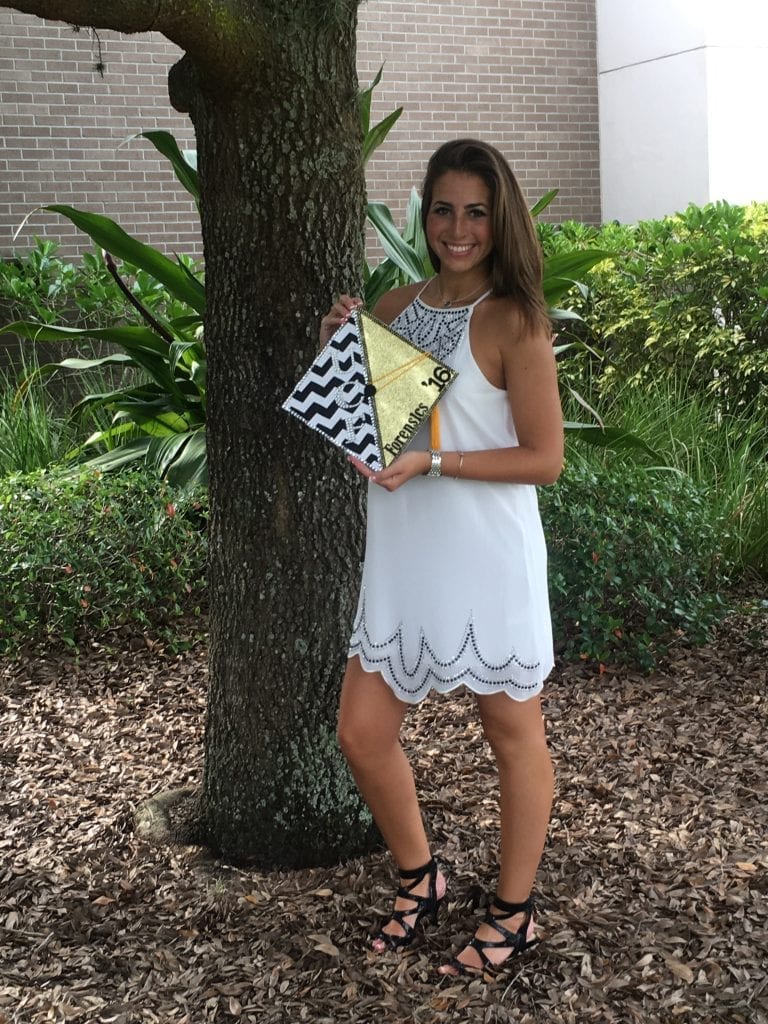Alumna Analyzes Drugs to Solve Crime

After completing a bachelor’s degree in forensic science with a minor in chemistry from UCF, Danielle Ostrow now identifies and analyzes controlled substances as part of her job as a forensic chemist at the Pinellas County Forensic Laboratory.
Ostrow built the foundation in identifying and analyzing controlled substances and gained valuable skills for her career through UCF’s classes and professors.
“My professors had high expectations and provided the necessary materials in order to understand theories and instrumentation such that I was able to learn the material rather than memorize it,” Ostrow said.
The path to completing her degree had a profound impact on her career. As part of her studies, Ostrow completed a 400-hour internship in order to graduate. The internship was an opportunity to take the knowledge obtained in classroom settings and apply it to real-life situations. As a result of her training from classes and on-the-job experience, Ostrow was offered a job as forensic chemist upon completion of the internship.
She now spends her days analyzing controlled substances in order to help the courts and law enforcement officials with investigations. Pinellas County Forensic Lab frequently receives subpoenas for analysts to testify as expert witnesses in court and must rush to analyze cases quickly and thoroughly. These cases need to be expedited in order to grant officers probable cause for warrants, to meet trial deadlines or there is reason to believe the evidence may contain fentanyl, a potent opioid resulting in death when misused.
Fentanyl and its derivatives are up to 10,000 times more potent than morphine, and can easily be inhaled or absorbed through skin resulting in unintentional overdose. For this reason, Narcan must be kept close at hand in the lab when evidence containing this substance is being processed. Narcan is used to counteract the effects of the opioid and save someone’s life in case there is an unintentional exposure.
A typical day doesn’t exist in this line of work. New drugs are constantly created and old ones are chemically altered in an attempt to circumvent current drug laws, so Ostrow always has the chance to discover new substances.
“My most memorable experience on the job so far was analyzing and identifying a controlled substance that had never been seen in the lab by any of the analysts,” she said. “Since then, the drug has been seen on multiple occasions, but the initial thrill of being the first analyst to receive evidence containing tertylone was exciting.”
Tertylone is a synthetic cathinone, part of a group of drugs commonly known on the street as bath salts. In Ostrow’s case, she received the drug as a residue on plant material. In an attempt to create synthetic cannabis, plant material is now being laced with other drugs besides synthetic cannabinoids, also known as spice or K2. This makes it difficult to identify a substance based on visual appearance. Forensic chemists must complete an extraction and interpret the data produced from a Gas Chromatography Mass Spectrometer and other confirmatory tests to determine the substance.
Ostrow was familiar with UCF because her two older sisters also earned degrees from the university. UCF’s well-recognized forensic program was also a contributing factor to her choice in attending. Since graduating, she continues to connect with other students and keep abreast of upcoming seminars thanks to the National Society of Leadership and Success.
“Never compromise of what you wish to achieve,” Ostrow said. “Even when pulling all-nighters seems nearly impossible and your performance doesn’t reflect your capability, you survive and make it one step farther than you were before. Any step forward, no matter how small, is a step in the right direction.”
